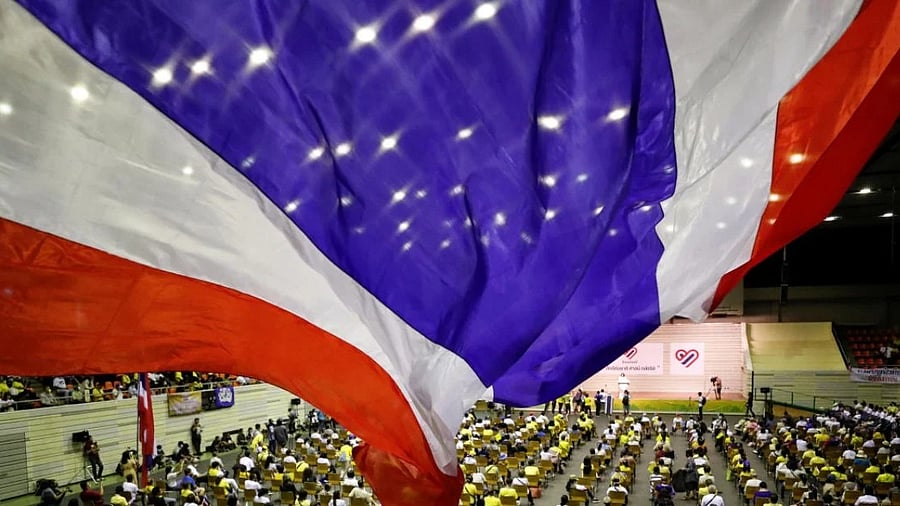
Thailand has experienced more than a dozen coups since absolute monarchy ended in 1932.
Credit: Reuters Photo
Bangkok: It is the enduring paradox of politics in Thailand.
By several measures, it appears democratic -- it is a constitutional monarchy that holds regular, competitive elections with high voter turnout and a young generation that is politically active. In practice, analysts say, the country is beholden to an unelected establishment comprising the powerful military, judiciary and the royal family.
Thailand has experienced more than a dozen coups since absolute monarchy ended in 1932. This constant tussle between movements to create democratic reform and the power of the old guard has created a decades-long cycle of instability.
Few people know this as intimately as the Shinawatra family, which has been at the center of the most dramatic moments in Thai politics in the past 20 years. On Friday, Paetongtarn Shinawatra will be the latest prime minister to have her fate decided by the Constitutional Court.
Here's what you need to know.
One Powerful Court
The Constitutional Court has tended to deliver rulings that produce outcomes seen to be broadly aligned with the interests of the establishment, according to Napon Jatusripitak, a visiting fellow with the Thailand Studies Program at Singapore's ISEAS-Yusof Ishak Institute.
This stems from the court's identity and its makeup. The court has come to be seen by conservatives as "a moral vanguard protecting Thailand's pillar institutions against what it perceives as democratic excesses," Napon said.
"This identity, rather than the rule of law, has become the main foundation of the court's legitimacy and the basis on which it justifies its interventions in Thai politics," he said.
Napon added that most of the current judges and past judges were appointed or had their tenure extended under military-led, conservative-leaning governments. "This means that the court's tendency to side with establishment interests in its rulings is already baked into its DNA."
Four Prime Ministers Ousted
Every prime minister brought before the Constitutional Court -- except for Prayuth Chan-ocha, a general who seized power in a coup -- has been removed. Since 2008, four leaders have been ousted -- all of them linked to Thaksin Shinawatra, former premier and Paetongtarn's father, and his political parties.
In 2008, a Thaksin ally, Samak Sundaravej, was removed after the court ruled that he violated the constitution by continuing to host a television cooking show and receiving a small payment for it while serving as prime minister. Months after, the court removed Samak's successor, Somchai Wongsawat, and dissolved Somchai's political party for electoral fraud.
In 2014, Thaksin's sister, Yingluck Shinawatra, was removed on charges of abuse of power. The court found her guilty of unlawfully transferring the head of the National Security Council to the post of adviser to the prime minister in 2011. This ruling came just before the military coup that overthrew her government.
Last year, Srettha Thavisin was ousted for violating ethics rules after the court found that he had breached the constitution by appointing a Cabinet minister who had previously served a jail sentence for a contempt-of-court conviction.
111 Political Parties Dissolved
Since its establishment in 1997, Thailand's Constitutional Court has dissolved 111 political parties -- many of them popular, pro-democracy parties.
The court has dissolved three political parties that were either founded by or linked to Thaksin. It disbanded the Thai Rak Thai Party in 2007 and the People's Power Party a year later, ruling in both instances that they committed electoral fraud.
In 2019, the Thai Raksa Chart Party, a party linked to Thaksin, was dissolved for "acting in a manner hostile to the constitutional monarchy" after it nominated a princess for prime minister.
In 2020, the Future Forward Party, which performed surprisingly well in the 2019 election, was dissolved on charges of taking an illegal loan from its leader. The ruling led to a 10-year ban from politics for its executives.
Last year, the Move Forward Party, the successor of the Future Forward Party and the winner of the 2023 election, was disbanded for its campaign to amend the country's harsh royal defamation law, which the court deemed as an attempt to overthrow the constitutional monarchy.